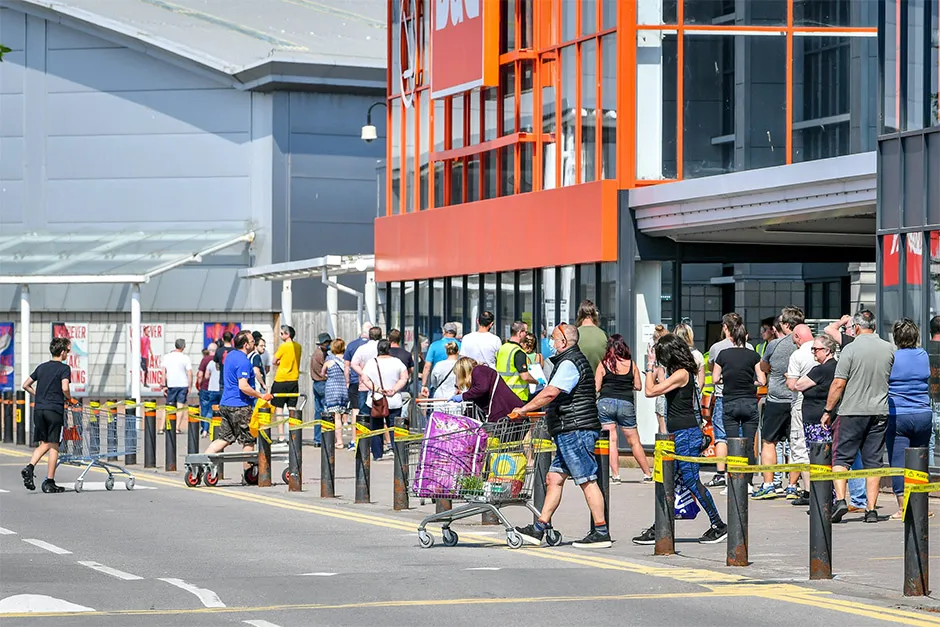Health officials fear Britons are starting to get complacent about the COVID-19 lockdown after traffic and mobile phone data revealed more of us are on the roads and looking for directions.
Professor Stephen Powis, national medical director of NHS England, said at the Downing Street briefing on Saturday “there was a little bit of concern” after the unseasonably warm weather drew big crowds to public spaces.
The Metropolitan Police sent officers on bikes to keep an eye on London’s Hyde Park, while North Yorkshire Police revealed 50 per cent of shutdown fines issued so far have gone to tourists visiting beauty spots in the area.
Elsewhere, B&Q’s decision to reopen 130 stores saw massive queues forming outside its outlets in Bristol and in Swansea, as the public use the shutdown to catch up on DIY.
Read more about lockdown:
- Lockdown alone not enough to build herd immunity, scientists warn
- COVID-19: What's the UK's exit strategy out of lockdown?
At the Downing Street briefing, Prof Powis said traffic levels are down 59 per cent compared to February, but grew by three percentage points in the last seven days compared to the previous week.
Mobility data released by Apple revealed that despite a dramatic drop in requests for directions, in recent days searches for maps for walking or driving have increased by eight percentage points.

Prof Powis said: “It won’t take much for this virus to start increasing its transmission again and to spread more widely.”
He added: “It would be foolish and not right if we lost the benefits that we have gained over the last four weeks, which I know have been hard for everybody. So it’s really important that, despite the weather, we stay at home, we keep to the guidelines that we’ve been issued with.”
The Metropolitan Police Federation (MPF), a body representing Met officers, said despite its assertions to the contrary, the government was sending out mixed messages around the shutdown.
MPF chairman Ken Marsh questioned the wisdom of allowing DIY stores to reopen.
Mr Marsh said: “Police officers are on the front line of combating the coronavirus crisis. We need clear and unambiguous laws, guidance and communication from the government around what the public can and can’t do. What is essential and what isn’t. If officers are confused about all this then so will the public be.”
Read more about COVID-19:
- Coronavirus: People aged 60-69 also at high risk, experts warn
- Coronavirus will circulate 'for many many years to come', top scientist warns
Various forces have highlighted the most flagrant breaches of the guidance they have come across on social media.Devon and Cornwall Police fined a couple from Kent for driving around 300 miles for a “mini-break” by the sea.Their car was confiscated after the driver was found to have no licence or insurance.
In Gwent, officers described it is “unacceptable” that people drove nearly 12 miles from Newport to the blue lagoon at Pantygasseg. Police in Gloucestershire issued warning letters to three people in Paganhill after holding a party at one of their houses. And a pub in Pendeford, Wolverhampton, had its licence suspended for three weeks for secretly serving alcohol.
How can I protect myself from the coronavirus when shopping?
You’ll have seen signs in your local supermarket advising you to keep two metres from others while moving around the store. This is key to reducing your chances of catching the virus while shopping.
The coronavirus SARS-CoV-2 is spread through respiratory droplets that leave our mouth and nose when we cough, sneeze, or sometimes even talk. The droplets sprayed out by an infected person will contain the virus, which could then enter your body via your mouth, nose or eyes (this is why you shouldn’t be touching your face).
Respiratory droplets don’t usually travel more than one metre, so by keeping two metres from others, you’ll reduce the likelihood of being in the firing line. To make it easier to keep your distance, try to shop during off-peak hours, choose a store that’s limiting the number of people who can be inside at any one time, and use self-checkout if you can.
Keeping your hands clean is the other main thing you can do. If possible, wipe the trolley or basket handles with a disinfectant wipe when you arrive at the store. When you get home, wash your hands or use hand sanitiser before and after unpacking your bags.
A US study found that the coronavirus can survive for up to 24 hours on cardboard, and up to three days on hard, shiny surfaces such as plastic, so wiping down your purchases with a disinfectant spray or a soapy cloth before you put them away is another good habit to get into.
Read more: